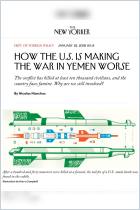Join getAbstract to access the summary!

Join getAbstract to access the summary!
Ginny Hill
Yemen Endures
Civil War, Saudi Adventurism and the Future of Arabia
Oxford UP, 2017
What's inside?
Though the Arab Spring brought change to Yemen, its aftermath has yielded only greater chaos for most Yemenis.
Recommendation
Though lauded for its relatively controlled power transition in the aftermath of the 2011 Arab Spring, Yemen remains a particularly puzzling place for most geopolitical experts. In this study of an oft-ignored nation, London journalist Ginny Hill offers a unique perspective – that of a Western reporter who has spent years getting to know Yemen’s complicated mix of religion, tribalism and outright anarchy. Taking readers from the beaches where Somali immigrants wash ashore to the president’s palace, Hill details key aspects of Yemen’s history and culture, illustrates how the possibilities for reform raised by the Arab Spring were squandered, and argues why the present wars in Yemen will likely endure for years to come. Hill combines an obvious empathy for Yemen with the objectivity of a professional journalist as she hammers home the point that the feeble state routinely fails everyday Yemenis. At times, explaining Yemen’s complexities is too tall a task for even a skilled narrator: Hill’s account occasionally devolves into a murky recitation of exotic locales, obscure names and shifting alliances. Nonetheless, getAbstract recommends this compelling, sober-minded look to those ready for a deep dive into a chaotic and geopolitically important nation.
Summary
About the Author
Ginny Hill is a visiting fellow at the Middle East Centre, London School of Economics and Political Science. She has covered Yemen as a journalist and policy adviser.

















Comment on this summary